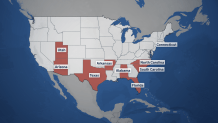What to Know
- New York, New Jersey and Connecticut will impose a self-quarantine requirement on travelers from any state where infections pass a certain level
- The order currently applies to eight states: Alabama, Arizona, Arkansas, Florida, North Carolina, South Carolina, Utah, Texas. The quarantine be voluntary to start in Connecticut.
- Connecticut residents who travel to those highly-infected states will need to self-quarantine when they return home
The governors of Connecticut, New York, and New Jersey said Wednesday they will implement a joint travel advisory requiring a self-quarantine of visitors from COVID-19 hotspots amid a surge in cases across nearly half the country.
The joint travel advisory will not stop people from traveling, but it will require anyone coming in from states having a high infection rate to quarantine for 14 days.
The criteria for states that have a high infection rate are 10 infections per 100,000 residents on a seven-day rolling average or 10 percent or higher of the state's total positive test rate on a rolling seven-day average, said New York Governor Andrew Cuomo.
Some eight states currently meet that "high infection" threshold: Alabama, Arkansas, Arizona, Florida, North Carolina, South Carolina, Utah and Texas. The list of states subject to the quarantine will be updated regularly.
The quarantine will begin at 12:01 a.m. on Thursday, Governor Ned Lamont said.
"The northeast region is taking this seriously," said Lamont.
Editor's note: Gov. Cuomo initially listed Washington state as one of the locations affected by the quarantine. Gov. Lamont's office later clarified that travelers from Washington state are not currently included. The list of states may change as officials continue to track the COVID-19 data from across the country.

U.S. & World
Governor Lamont said the state will be doing everything it came to let visitors know they can come to Connecticut but must "come safely."
"We welcome visitors but only if they self-quarantine from highly infectious states," Lamont said.
HOW WILL THE QUARANTINE BE ENFORCED?
Each state will decide on its own enforcement mechanism, Cuomo said.
As of Wednesday, Lamont said there were no fines planned right now for violation of the quarantine in Connecticut.
"Right now, it's going to be voluntary," Lamont said when asked how the quarantine will be enforced.
The state is focusing on "individual accountability" for compliance, said Josh Geballe, Connecticut's Chief Operating Officer.
"If we find that's not working, if we find that people are abusing that, we'll consider some stricter measures for enforcement," the governor said.
Geballe stressed there are no plans to utilize the National Guard to enforce the quarantine.
Lamont said the state will notify hotels, short-term rentals and Airbnbs about the quarantine requirements. Passengers to Bradley Airport will see signs alerting them to the quarantine.
"Right now, we're very strict on publicity," Lamont said.
In New York, if you are caught violating the travel advisory, you could be subject to a judicial order mandating quarantine and a possible fine, Cuomo said.
Governor Lamont said he is considering a negative COVID-19 test result within several days of travel to Connecticut as a possible way to get an exemption to the quarantine citing business travelers and others who may not have 14 days planned here.
CONNECTICUT RESIDENTS RETURNING HOME MUST QUARANTINE TOO
Connecticut residents who travel to those highly-infected states will need to self-quarantine when they return home.
"If you're coming back from Miami Beach, you have to quarantine just like anyone else," Lamont said.
Both business and pleasure travelers will be subject to the quarantine.
"We need to do things right inside the four walls in our respective states," Gov. Phil Murphy said at a Wednesday news conference with Gov. Andrew Cuomo and Gov. Ned Lamont. "The last thing we need to do right now is to subject our folks to another round."
Both Cuomo and Lamont previously raised the prospect of having visitors self-quarantine for two weeks if they were coming from parts of the country with high or rising rates of COVID-19.
Lamont on Wednesday cited the problem of states where 25 percent of people or more were testing positive, and where infections were spreading aggressively not just in nursing homes but among younger populations.
But whereas nearly 800 people a day were dying just in New York at the peak of the crisis, that toll is now down to less than 30 a day. Meanwhile, cases are spiking to their highest levels yet in places like Florida, Texas and Arizona.
"It's clear ... there is a problem in a number of other states and we have to be very careful about the impact that would have on New York," New York City Mayor Bill de Blasio said at a Wednesday news conference.
Cuomo said the quarantine is not a ban and does not stop people from coming to the state.
"I am concerned that there's an awful lot of flights into Bradley every day from Florida and that Florida has an infection rate -- a positivity rate -- that is ten times what we are here in Connecticut," Lamont said. "And that's true of a number of other states, like Texas and Arizona as well. So that's why we have been talking with our fellow governors about perhaps a quarantine or a testing protocol before people from a highly infected area come to a less infected area, like Connecticut."



